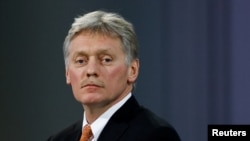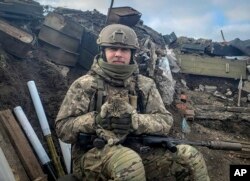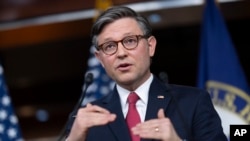The Kremlin on Monday agreed with a comment made by Pope Francis, during an interview with Swiss broadcaster RSI, that Ukraine should have the “courage” to negotiate with Russia two years after the Russian invasion of Ukraine.
"It is quite understandable that [the pope] spoke in favor of negotiations," Kremlin spokesman Dmitry Peskov told reporters.
Peskov said President Vladimir Putin had repeatedly said Russia was open to peace talks. "Unfortunately, both the statements of the pope and the repeated statements of other parties, including ours, have recently received absolutely harsh refusals," he said.
Putin has essentially offered to freeze the battlefield along its current front lines, an option Ukraine rejects.
Such an agreement would mean giving up territory that Moscow has seized that amounts to more than a sixth of Ukraine.
Peskov said Western hopes of inflicting a "strategic defeat" on Russia were "the deepest misconception," adding: "The course of events, primarily on the battlefield, is the clearest evidence of this."
However, NATO Secretary-General Jens Stoltenberg said now is “not the time to talk about a white flag.” Speaking at NATO headquarters in Brussels, Stoltenberg said negotiations would be undertaken only if they preserved Ukraine as a sovereign and independent nation and only when Putin realized that he would not win on the battlefield.
"If we want a negotiated, peaceful, lasting solution, the way to get there is to provide military support to Ukraine," the NATO chief said.
"It's not the time to talk about surrender by the Ukrainians. That will be a tragedy for the Ukrainians," he said. "It will also be dangerous for all of us, because then the lesson learned in Moscow is that when they use military force, when they kill thousands of people, when they invade another country, they get what they want."
Kyiv on Sunday criticized Francis' call for Ukraine to negotiate an end to the war, with President Volodymyr Zelenskyy saying the pontiff was engaging in “virtual mediation.”
In his nightly video address Sunday, Zelenskyy thanked Ukrainian religious leaders who are on the front line, “protecting life and humanity,” and who show support with “prayer, conversation and deeds.”
“This is what the church is,” he said, “one with the people. Not two and a half thousand kilometers away — somewhere, looking for a virtual [mediation] between those who want to live and those who want to destroy you.”
In a statement published on its website, the German Bishops' Conference said it was ultimately up to Ukraine to decide, "after careful consideration, when the moment has come for peace negotiations."
"The fact that Pope Francis did not address the points mentioned here in his interview caused irritation among many observers, which we can understand,” the German bishops said. “It would be good if the Holy See communicated a substantive clarification of its position on these issues."
Vatican spokesperson Matteo Bruni responded to the criticisms Sunday, saying that the pontiff urged “a stop to hostilities [and] a truce achieved with the courage of negotiations,” rather than an outright Ukrainian surrender.
Francis was asked in an interview last month with Swiss broadcaster RSI about the debate between those advocating for Ukraine to engage in peace talks and those who say those negotiations would legitimize Russia’s act of aggression.
“I think that the strongest one is the one who looks at the situation, thinks about the people and has the courage of the white flag, and negotiates,” Francis said.
Ukrainian Foreign Minister Dmytro Kuleba also criticized the pope’s remarks on social media, saying that "our flag is a yellow-and-blue one. This is the flag by which we live, die and prevail. We shall never raise any other flags."
Meanwhile, political wrangling in the U.S. Congress is stalling a $60 billion aid package to a Ukraine military short of ammunition.
Russia is currently poised to produce nearly three times more artillery munitions than the U.S. and Europe do for Ukraine, according to a Monday report by CNN based on NATO intelligence.
For every shell Ukraine fires along the front lines, Russia fires between five or six, according to defense analysts. The imbalance restricts Ukraine's ability to suppress Russian attacks and provide cover for its own troop movements.
While Russia increases weapons production and can maintain a much higher rate of fire than Ukraine, Western experts say Moscow also faces some constraints and has turned to North Korea to bolster its munitions supplies.
Russia’s military said Monday that it had thwarted multiple Ukrainian drone attacks on Russian territory.
The Russian defense ministry said its air defenses destroyed four drones over the Bryansk region, two over the Oryol region and another Ukrainian drone over the Belgorod area.
Ukraine’s defense ministry issued alerts Monday warning of Russian aerial attacks in the Donetsk, Sumy, Dnipropetrovsk and Kharkiv regions.
Some information for this report came from Reuters, The Associated Press and Agence France-Presse.








